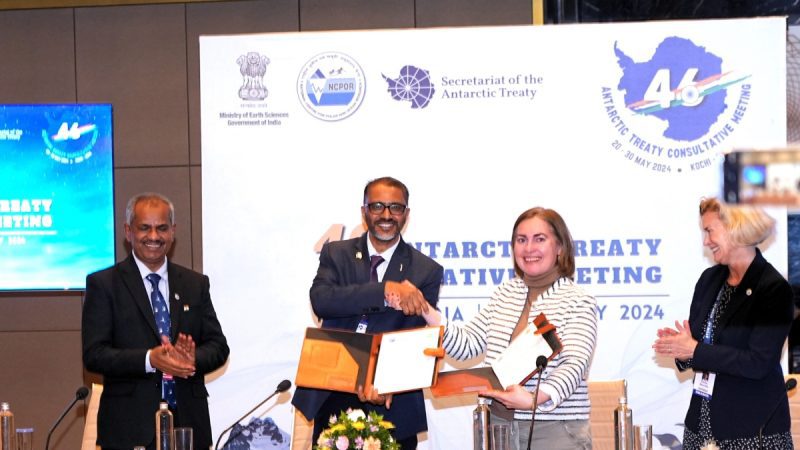Antarctica stands as a frozen frontier, veiled in mystery and awe-inspiring grandeur. While often regarded as a remote and desolate realm, it holds profound significance in shaping the delicate balance of our planet’s climate systems and oceanic currents. The 46th Antarctic Treaty Consultative Meeting (ATCM) is officially underway in Kochi, Kerala, and all eyes are focused on this mysterious continent. Here, specialists, scientists, and diplomats collaborate to unravel the continent’s mysteries and chart its course for the future.
Kochi Hosted 46th Antarctic Treaty Consultative Meeting
The annual Antarctic Treaty Consultative Meeting (ATCM) serves as a pivotal event where representatives from various countries come together to discuss matters concerning Antarctica’s governance, policies, and operations. For Antarctica, this meeting holds unparalleled significance as it shapes the rules and procedures governing activities on the continent.
With each decision requiring the approval of ATCM parties, the meeting stands as the sole forum for such determinations. India, as one of the 29 consultative parties, recently hosted the 46th edition of the ATCM in Kochi, Kerala, underscoring its importance in the global arena.
During the conference, Thamban Meloth, Director of the National Centre for Polar and Ocean Research (NCPOR), highlighted India’s research endeavours in Antarctica and addressed the implications of climate change. Discussing the agenda, Meloth emphasised the escalating issue of tourism in Antarctica, particularly adventure tourism, and its safety concerns, according to the Hindustan Times. He also disclosed the establishment of a new working group dedicated to devising a framework for regulating tourism activities.
Also Read: Chennai-Mumbai IndiGo Flight Receives Bomb Threat, Prompting Emergency At Mumbai Airport
How Antarctica’s Changes Impact The World?
India’s involvement in Antarctic research dates back to 1981, marked by the establishment of research stations such as Dakshin Gangotri and Maitri. These stations serve as bases for scientists to conduct experiments and observations, focusing on climate change’s impact on Antarctica and its repercussions for tropical countries like India.
As per Hindustan Times reports, Meloth underscored the importance of studying Antarctica’s ice deposits as indicators of climate trends. He also highlighted the emergence of extreme weather events in the region, attributed to global atmospheric phenomena like Atmospheric Rivers.
Drawing attention to the interconnectedness of global climates, Meloth emphasised how events in Antarctica reverberate worldwide, influencing climate patterns, sea levels, and ultimately, food security. The discussion extended to the necessity of grassroots-level policy-making on climate change in India, particularly concerning extreme weather events like cloudbursts.
The discussion captured the complex issues raised by climate change and emphasised the need for international cooperation and community-based efforts.
Cover Image Courtesy: NCPOR/X

